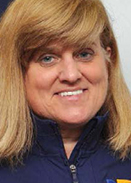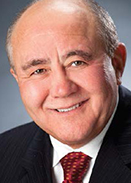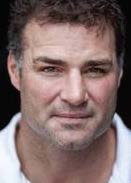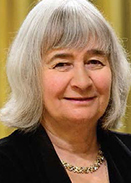Minister’s Year Two Progress Report on Rowan’s Law (Concussion Safety), 2018
Read about our year two achievements in implementing the 21 recommended actions of the Rowan’s Law Advisory Committee.
Minister’s Message
Commemorating Rowan’s Law in 2020 is much different than years past because of COVID-19, but we remain committed as a Province and as a sports community to carrying on the legacy of Rowan Stringer, her parents—Kathleen and Gordon—and all of those who advocate for safety in play even during the pandemic.
Though much of our conversation this year on safe sports has centred on what a safe return to play would like post pandemic (even mid pandemic) the Province of Ontario will continue to advance awareness on concussions and their potentially fatal consequences.
As Ontario’s Sport Minister and the author of Rowan’s Law while I was an Opposition Member, I am pleased to report most recommendations from the Rowan’s Law Advisory Committee have been achieved. As we eye the safety of sport on a go forward basis, concussion protocols, mental health, physical safety, and of course post pandemic return to play, will all be on top of mind for the protection of Ontario’s amateur and high-performance athletes. With that in mind, a broadening of the wellbeing of these athletes will be on the forefront of all of our sport planning in a coordinated manner under the name of Rowan Stringer. In addition to this planning, I am grateful that my Federal, Provincial and Territorial colleagues will be participating in a national concussion conversation, and that the Ontario Government is working with Tim Fleizser, the Concussion Legacy Foundation (Canada) on enhancing educational opportunities for rural Ontarians on concussion safety while also supporting their efforts on a documentary on the life of Rowan Stringer who was tragically taken from us at 17 years old because of second impact syndrome after sustaining multiple concussions.
Rowan’s Law is deeply personal to me. Although I never had the opportunity to meet Rowan, her parents have become wonderful friends. This movement under her name has brought unanimous, all party legislative support thanks to the help from my friends MPP’s Catherine Fife and John Fraser and it’s brought some of the best-known Canadian athletes together like Hockey Hall of Famer, Eric Lindros and Olympic Gymnast Rosie McLennan. The work is not done. Rowan Stringer’s passing, because of unsafe practices in sport, inspired a groundswell for better concussion protocols. But her legacy will not only ensure Ontarians are better educated and expected to adhere to these protocols, but also become the model for a better integrated and safer sporting environment for all in a post pandemic Ontario where mental health and a return to play will be critical.
To Kathleen, Gordon and their daughter, and Rowan’s sister, Cassie, whom Rowan’s Law was dedicated, I send my love and deep admiration. Your “Little Row” has inspired a province.
Honourable Lisa MacLeod, MPP (Nepean)
Minister of Heritage, Sport, Tourism and Culture Industries
During these unprecedented times, the health and safety of our kids has never been more important. As sports resume safely in our schools and communities, it’s clear from this report that the tremendous efforts on the part of the parents, trainers, coaches, sports organizations, and our government are paying off when it comes to raising awareness about concussions. We will continue to advance the important work of Rowan’s Law and make sports safer for every child in Ontario.
Doug Ford, Premier of Ontario
Introduction
A Changing Landscape in Sport
Ontario is a world leader in concussion safety and is the first jurisdiction in Canada to pass concussion safety legislation. Through hard work, determination and grassroots support, the province has come together as one community, to change the culture of concussions in amateur sport through Rowan’s Law (Concussion Safety), 2018 (“Rowan’s Law”).
The legislation was named for Rowan Stringer, a 17 year old high–school rugby player from Ottawa, who died in the spring of 2013 from a condition known as second impact syndrome (swelling of the brain caused by a subsequent injury that occurred before a previous injury healed). Rowan is believed to have experienced three concussions over six days while playing rugby — a sport she loved.
This landmark legislation is a great legacy to the young woman it is named for — Rowan Stringer — a catalyst to change the conversation around concussions and how they are perceived and managed. Rowan’s Law and related amendments to the Education Act are changing the culture of sport in Ontario, enabling athletes, students, coaches, officials, team trainers, educators, spectators and families to understand the role they play in recognizing the signs and symptoms of a concussion and reducing the pressure to play through head injuries.
In response to Rowan’s tragic death, the provincial government reviewed the final verdict from the Coroner’s Inquest in 2015, which contained 49 recommendations intended to help prevent similar deaths in the future. What followed was the creation of a government–appointed external advisory body – the Rowan’s Law Advisory Committee, to provide advice to government on the best ways to implement the Coroner’s recommendations, including additional recommendations with respect to head injury prevention and treatment. The 21 recommended action items brought forward by the Rowan’s Law Advisory Committee focused on safe participation in organized amateur sport through the following five themes: awareness, prevention, detection, management and surveillance. These themes have focused and guided government action since September 2017.
Evolving from a grassroots level, Rowan’s Law is an exceptional achievement that has received unified support from Ontario’s sport community and education sector. This legislation will strengthen how our province addresses concussion safety in the years ahead. Ontario’s amateur athletes and students are now safer on a wide range of fields of play across 65 unique sports.
This past year brought significant change to the landscape of competitive amateur sport. In March 2020, amateur sport came to a halt as a result of the COVID–19 outbreak. The scale of its impact across multiple sectors, including Ontario’s sport sector, has been profound — and the road to recovery will be a long one. As a result of the outbreak, government quickly shifted its focus to protect the health and well–being of Ontarians by containing the spread of the virus primarily through physical distancing measures. This shift in priorities has impacted the government’s ability to make planned progress on the Rowan’s Law initiative throughout the period of the ongoing outbreak.
While these are unprecedented times, the health and safety of all Ontarians, including all athletes and students participating in sport, remains a priority for the government of Ontario. This Minister’s Progress Report features some of the great work that the government (and its partners) have been able to achieve in Year 2 of its implementation plan.
Twenty One Recommended Action Items
Year One: Eleven Recommendations Completed
- Legislation
- Evaluation of PPM 158 in schools
- Training for coaches
- Coach’s Toolkit
- Concussion Training for teacher candidates
- Re–branding Concussion Portal
- Awareness campaign
- Annual concussion awareness education event in schools
- Mandatory concussion education for all teachers
- Creation of Rowan’s Law Concussion Working Group
- Concussion Codes of Conduct
Year Two: Four Recommendations Underway, One Recommendation Completed
- Standards and accountability for fields of play
- Concussion Spotter at all games and practices
- Enhancement of concussion education for health care professionals
- Work with Indigenous Leaders to support dissemination and implementation of concussion management
- Develop and deliver concussion education in schools for all students
Year Three: Four Recommendations Under Analysis
- Public reporting on concussion incident data
- Collection of data about removal from sport at field of play
- Investment in electronic data collection/sharing tool about incidents at field of play
- Creation of Special Fee Codes in OHIP
One Ongoing Recommendation
Federal government to play a leadership role around concussions in schools and non–school environments
Executive Summary
Building on the success of the government’s Year 1 plan to implement Rowan’s Law, this Minister’s Progress Report highlights the achievements made in Year 2 towards the implementation of the remaining recommendations set out in Creating Rowan’s Law: Report of the Rowan’s Law Advisory Committee (“Rowan’s Law Advisory Committee Report”). Even with the challenges presented by COVID–19, key partner ministries and stakeholders remained committed to setting a course forward to deliver on Year 2 recommendations. To date, a total of 12 actions are completed, 4 are underway, 4 continue to be analyzed and 1 is ongoing as the government enters Year 3 of its implementation plan.
Highlights of Accomplishments
Year 2 implementation of Rowan’s Law has resulted in some worthy milestones for the government and the sport sector.
In September 2019, the Ministry of Education released its updated concussion safety policy with new requirements, strengthening existing policy for school boards, school authorities and provincial and demonstration schools. The updated policy, which is consistent with Rowan’s Law, came into effect on January 31, 2020. New and revised concussion safety resources were also made available to the education sector, including concussion education modules for students at the elementary and secondary level.
In response to the immediate impact of the COVID–19 outbreak on the health care system and the sport sector, the Ontario government made the decision to postpone the effective date of Phase 2 implementation, which requires sport organizations to have concussion protocols in place for their athletes, from July 1, 2020 to January 1, 2021. This deferral gives sport organizations additional time to implement these requirements, allowing them to dedicate the necessary capacity and resources to respond to COVID–19.
When amateur sport activities and competitions do resume, athletes, parents and guardians, coaches, team trainers and officials will have access to additional concussion awareness tools and resources. Some of these new tools and resources include removal–from–sport and return–to–sport protocol templates for sport organizations to use when developing their own concussion protocols; concussion awareness videos designed for three different age groups; an online concussion awareness e–module; concussion awareness resource e–booklets in 18 other languages, including five Indigenous languages; and an adapted e–booklet and Concussion Codes of Conduct for athletes and students with developmental abilities, along with a new concussion caregiver supplementary guide to support athletes’ understanding of Rowan’s Law. These resources can be accessed at Ontario.ca/concussions.
This suite of Concussion Awareness Resources and supporting templates will go a long way to increasing concussion awareness and education for athletes, students, parents, coaches, team trainers, officials and educators, making concussion management more consistent across the province.
At last year’s Rowan’s Law Day event, the Honourable Lisa MacLeod, Minister of Heritage, Sport, Tourism and Culture Industries, announced a new partnership with Concussion Legacy Foundation Canada (CLFC) to support community–based awareness and education programming on concussion safety for youth athletes across Ontario.
Together, ministry partners and sector stakeholders have continued to make progress on completing and further enhancing some of the remaining recommendations made by the Rowan’s Law Advisory Committee, including: the mobilization of concussion education and resources for health care professionals; a Fall/Winter multimedia awareness campaign for Rowan’s Law; discussions for releasing best practice guidelines and tools for inspecting fields of play; and, the launch of an updated Coach’s Concussion Toolkit, among others.
The government continues to review and analyze the Advisory Committee’s recommendations that pertain to concussion management and concussion surveillance, including: potential options for acquiring an electronic data collection/sharing tool; supporting sport organizations in the collection and reporting of concussion information at the field of play; collating and sharing concussion incidence data on an annual basis; and, exploring the opportunity to introduce a new OHIP fee code for concussion assessment, ongoing concussion management and clearance.
Year Two Achievements
Legislation
Change of Proclamation Date
July 1, 2020 would have marked the effective date for implementation of Phase 2 of the Rowan’s Law (Concussion Safety), 2018, and its corresponding regulation, O.Reg. 161/19: General, which requires sport organizations to establish removal–from–sport and return–to–sport protocols for its athletes. As a result of the COVID–19 outbreak and its impact on the health care system and sport sector, the Ontario government made the decision to postpone the effective date of Phase 2 implementation of Rowan’s Law to January 1, 2021. This deferral is intended to give sport organizations, including municipalities, post–secondary institutions, community centres, and private sport clubs or sport entities additional time to implement these requirements and dedicate the necessary resources to respond to the COVID–19 outbreak. Only the effective date of Phase 2 implementation was changed. All requirements related to the protocols in the legislation and the regulation remain the same.
New Requirements for School Boards
On September 25, 2019, the Ministry of Education released its updated provincial policy on concussions, Policy/Program Memorandum (PPM) 158: School Board Policies on concussions, for school boards, school authorities and provincial and demonstration schools. The updated PPM 158 reflects legislative changes that occurred since the original policy was released in 2014 and is consistent with Rowan’s Law. Requirements for concussion safety are now consistent for the sport and education sectors in Ontario.
The updated PPM 158 addresses concussion safety across all school and school board activities and sets out the minimum requirements that must be included in school board policies on concussion. Now all school board policies on concussion must include the following requirements:
- The confirmation of annual review of approved Concussion Awareness Resources by individuals participating in board–sponsored interschool sports.
- The establishment of Concussion Codes of Conduct for individuals participating in board–sponsored interschool sports, and the confirmation of annual review of the relevant Code of Conduct by those individuals.
- Annual concussion training for relevant school staff.
- The establishment of an updated process for the removal of students with a suspected concussion from physical activity and, for those diagnosed with a concussion, a Return to School Plan, which includes their return to learning and return to physical activity.
- The establishment of a process to document and track a student’s progress from the removal from an activity due to a suspected concussion to the return to learning and to physical activity.
These new concussion policy requirements for school boards came into effect on January 31, 2020. The following resources, consistent with Rowan’s Law requirements, were made available to support implementation of the updated policy:
- Sample concussion code of conduct templates for the education sector (for coaches/trainers, for parents/guardians, and for students).
- An e–learning module on concussion safety for school staff.
- Ophea’s concussion protocol, which includes steps for concussion identification and templates for the graduated steps for the return to learning and return to physical activity (i.e., the Return to School Plan).
- Sample forms e.g., Sample Medical Concussion Assessment Form, Sample Home Concussion Management Form, Sample School Concussion Management Form, and Sample Medical Concussion Clearance Form).
The updated PPM 158 and related resources were shared with the education sector and strengthens the Ministry of Education’s commitment to concussion safety in Ontario.
Removal–from–Sport & Return–to–Sport Protocols
Under Rowan’s Law, sport organizations are required to establish removal-from-sport and return–to–sport protocols for its athletes. The establishment of these protocols is necessary to ensure that consistent processes are in place for the immediate removal of an athlete from sport when a concussion is suspected, and to ensure that an athlete with a concussion or a suspected concussion does not return until medically cleared by a physician or nurse practitioner to do so.
To assist sport organizations in meeting their obligations under Rowan’s Law, the Ministry of Heritage, Sport, Tourism and Culture Industries (MHSTCI), in partnership with Parachute Canada, developed a sample Removal–from–Sport and Return–to–Sport protocol template for sport organizations to use or adapt when establishing their own sport specific protocols. This sample template is currently posted on the government’s Concussion Webpage at Ontario.ca/concussions.
Concussion Awareness Resources
Parachute was pleased to partner with the province to develop the ebooklets, videos, online training modules and other resources to raise awareness of concussion recognition and management for the province’s publicly funded schools and for sports organizations that deliver amateur competitive sports in higher–risk sports. These resources, aligned with our Canadian Guideline on Concussion in Sport and mandated by Rowan’s Law, are available to all Ontarians and have been created to be accessible to a variety of audiences, from children to coaches.
Pamela Fuselli, President and CEO, Parachute
Over the last year, the government of Ontario continued to work closely with Parachute Canada to complete the remaining suite of Concussion Awareness Resources.
Since the release of the Concussion Awareness Resources: e–Booklets in English, French, and 12 other languages, have been made available, including additional e–Booklets in the following five Indigenous languages:
- Cree,
- Oji–Cree — Syllabic,
- Ojibway — Alpha Roman,
- Inuktitut (Inuit language), and
- Mohawk.
This September, the government released three Concussion Awareness Videos and an e–Module — all available at Ontario.ca/concussions in both English and French. Like the e–Booklets, the videos were tailored to three target age groups to ensure that information about concussions – including the nature of concussions; common signs and symptoms of a concussion; steps to be taken to prevent concussions; steps to be taken if an athlete is suspected of having a concussion; and, components of a concussion removal–from and return–to–sport protocol — were all delivered in an age appropriate manner. These age categories include: Ages 10 & Under; Ages 11 - 14; and, Ages 15 & Up.
The e–Module is an interactive learning tool that includes knowledge checks and engaging activities to assess the learner’s preliminary knowledge of concussions, and to further support the learner’s understanding of concussions. The e–Module includes a final quiz to receive immediate feedback on the participant’s learning experience.
With the advice and support of the Ministry of Education and the Ministry of Health, these distinct Concussion Awareness Resources (e–Booklets, Videos and e–Module) were developed to support different learning styles as the resources must be reviewed by athletes, students participating in interschool sports, parents/guardians of athletes under 18 or students under 18 participating in interschool sports, coaches, team trainers and officials prior to participating in amateur competitive sport or interschool sport.
Special Olympics Ontario is deeply grateful for the opportunity to collaborate with the Government of Ontario and the University of Toronto in the development of these important concussion resources for athletes and participants of all abilities. This collaborative effort has created the opportunity to engage athletes with intellectual disabilities, the families and coaches that support them and leading experts across the sector in developing a vital resource to promote and advance the objectives of Rowan's Law for Ontarians of all abilities.
Glenn MacDonell, President & CEO, Special Olympics Ontario
Earlier this year, the government partnered with Special Olympics Ontario to adapt the existing Concussion Awareness Resource: e–Booklets and Concussion Codes of Conduct to better support students and athletes with intellectual disabilities and their families in learning about concussion safety in sports.
To support this work, a steering committee consisting of researchers from the University of Toronto (Drs. Kelly Arbour–Nicitopoulos, Emily Bremer and Nick Reed) and the program director of Special Olympics Ontario (James Noronha) was established to discuss how to adapt the existing e–Booklets and Concussion Codes of Conduct for athletes and students with intellectual disabilities. Discussion participants included Special Olympics coaches, Special Olympics athletes, parents and siblings of athletes with intellectual disabilities, disability sport council representatives, and disability and sport and concussion researchers. The groups input and feedback became the foundation for creating a new caregiver supplementary guide to support athletes’ understanding of Rowan’s Law and the role they play in this legislation. These two resources were then evaluated by the discussion participants in July 2020 using an online survey to ensure their input was reflected accurately.
This extensive consultation process and collaborative approach to the project resulted in the development of the Athlete Concussion Awareness Resource: A guide for students and athletes of all abilities and Caregiver Concussion Awareness Resource: A supplementary resource to the guide for students and athletes of all abilities which are both available at Ontario.ca/concussions.
Between September 2020 to June 2021, the steering committee will develop an implementation process for these new resources and will be evaluating their implementation. This evaluation will focus on who is using the resource, what the barriers/facilitators are to use and if using the resource leads to changes in concussion knowledge, attitudes and behaviours.
Rowan’s Law Day
The last Wednesday in September has been designated as Rowan’s Law Day to help raise awareness about concussions and concussion safety in sport. At last year’s Rowan’s Law Day event, held on September 25, 2019, the Honourable Lisa MacLeod, Minister of Heritage, Sport, Tourism and Culture Industries was joined by Gordon Stringer, father of Rowan Stringer, and hockey hall of famer Eric Lindros, at Rowan’s Pitch in Ottawa to honour Rowan’s memory and to reinforce the government’s commitment to leading change for concussion safety in the sport system. At the event, Minister MacLeod announced the release of the Minister’s Year One Progress Report, and that Ontario was partnering with Concussion Legacy Foundation Canada (CLFC) to support prevention, education and awareness across the province.
With Ontario’s investment, CLFC used the funding to expand community–based awareness and education programming on concussion safety throughout the year, including; See the Line Community Symposium; the delivery of Team Up Against Concussions seminars across Ontario university campuses; and unique skills camps to educate youth athletes on how to engage in proper body contact in soccer, hockey, football and lacrosse.
In recognition of last year’s Rowan’s Law Day, Stephen Lecce, Minister of Education, visited Notre Dame Catholic Secondary School in Brampton to discuss concussion safety with students.
Awareness
Concussion awareness has been a defining issue for a generation of students and Rowan’s Law has made an impact on over 2 million children and youth in Ontario’s education system. Because of Rowan’s Law we have higher levels of awareness, enhanced tools that spark conversation and action, a policy that protects and educates and increased training and education for students as well as all school staff. A continued emphasis on coordination, education and awareness will help us realize the vision behind Rowan’s Law.
Chris Markham, Executive Director & CEO, Ophea
Development and Delivery of Concussion Education in Schools for all Students
The Ministry of Education released concussion education modules for students in Grade 6 and Grade 9 in fall 2020. The student modules and accompanying teacher guides provide opportunities for both independent learning online and for teacher–facilitated learning. The resources, available in English and in French, use the Government of Ontario’s Concussion Awareness Resources to support student learning and are connected to Ontario’s Health and Physical Education curriculum.
The updated PPM 158 also directs school boards to include provisions in their concussion policies for connecting student learning about concussions with the curriculum. The Ontario Curriculum, Grades 1-8: Health and Physical Education includes mandatory learning about concussions in every grade. In addition, the 2019 Addendum to The Kindergarten Program includes learning on concussions and the Ontario Curriculum, Grades 9-12: Health and Physical Education includes concussion-related prompts and examples to facilitate student learning.
Finally, to further promote concussion education, the updated PPM 158 directs school boards to include in their concussion policies implementation plans for an annual concussion awareness event for students on or around Rowan’s Law Day.
Enhancement of Concussion Education for Health Care Professionals
The Ministry of Health has been working to identify a number of existing quality concussion resources that can be leveraged by health care professionals for the purposes of their concussion–related work. A health care provider fact sheet has been developed to provide an overview of the Rowan’s Law legislation for health care providers, and a snapshot of existing concussion resources from reputable sources that can be utilized by health care professionals. The Ministry of Health will share the fact sheet with the health sector prior to January 1, 2021, the new effective date of Phase 2 implementation of Rowan’s Law, to ensure that providers are equipped with appropriate resources to support them in concussion assessment and clearance.
Integrated Awareness Campaign
Following a successful launch of the sustained, multi–channel, integrated public awareness campaign for Rowan’s Law in the Spring and Summer of 2019, an additional phase of the campaign rolled out between July 2019 and March 2020. Highlights of this phase included the re–release of “The Risk” public service announcement video over social media, in cinemas, broadcasted on TV during key June sporting events on Sportsnet, and posted on YouTube, where it has received over 9 million views. The three digital ads re–appeared in post–secondary campuses, recreation centres and on close to 1,000 GoodLife Fitness TV screens. The Rowan’s Law icon and Hit.Stop.Sit. tagline also appeared on over 300 hockey rink–boards in community arenas across the province. In addition, Rowan’s Law posters and stickers continued to be distributed to private and publicly funded schools and post–secondary campuses throughout the Fall and Winter semesters.
Following positive reviews from the public, the government extended the placement of the Rowan’s Law icon and Hit.Stop.Sit tagline on hockey rink–boards through to March 31, 2020.
Campaign Awareness: Phase Two Achievements (July 12, 2019 to January 8, 2020)
Web Searches
- Rowan’s Law and Concussions were top Google Ads key words
Concussion Website
- Viewed close to 32,000 times
- Visitors spent on average four minutes on the concussion website, 45% above the government average
- “Rowan’s Law” was the most popular searched term during Phase 2 of the campaign, with “concussion symptoms” post campaign
Social Media
- Trending topics PPM 158, Concussion Care, Students and staff
- Trending hashtags #RowansLaw, #HitStopSit, and #concussions
Public Service Announcement
- PSA played over 26.0 million times, over phase 1 and phase 2 of the campaign
- 30 second “The Risk” video and Game Line animated posters shown in 67 different theatres across Ontario
Phase 2 of the government’s integrated awareness campaign saw an overall increase in the reach and frequency of views compared to phase one. As part of Phase 2 of the awareness campaign, website traffic for Ontario.ca/concussions was viewed over 14.2 million times and reached approximately 4 million unique users.
A major spike in website traffic occurred last year on Rowan’s Law Day, September 25, 2019, with close to 6,000 internet and social media pageviews. This successful spike was previously matched during Phase 1 with the launch of the awareness campaign on May 14, 2019. The spike in website traffic also coincided with successful social media activity, particularly through Twitter. The campaign hashtag #RowansLaw and #HitStopSit went viral with 46 per cent of social mentions:
- #RowansLawDay was trending on Twitter worldwide and in Canada throughout the day.
- Posts about #RowansLawDay were compiled into a Twitter Moment by Twitter Canada – which showcases the very best of what's happening and trending on Twitter.
Phase 2 of the awareness campaign has been a great success with the majority of viewers expressing support for the law and the educational value of the campaign. The 30–second public service announcement video, entitled “The Risk”, was shown in 67 different movie theatres across Ontario between July 12 and August 8, 2019, and on YouTube until November 25, 2019.
By October 2019, the 30–second video received 1 million views and the 15–second video received 9.3 million views. The success of the public service announcement video, which appeared in cinemas for a second run during the 2019 winter holidays, resulted in numerous media and advertising awards, including:
- Two golds at the AToMiC awards in the categories of AToMiC Idea and Online Video
- Applied Arts’ 2019 Advertising Awards in five different categories
- Multiple wins in the Canadian Marketing Association Awards for categories of health and social causes engagement and brand building
- A silver and bronze award in Clio Advertising Awards for film production and audio
The Game Line animated posters (i.e., basketball, hockey and soccer) were shown in 63 theatres in phase 1 from May 31 to June 27, phase 2 from July 12 to August 8 and in phase 3 from November 6 to January 2. With a total duration of 12 weeks in market, the government saw a 51% increase in the number of times the digital posters were displayed on screens in cinema lobbies.
The momentum for Phase 2 remained strong as the campaign expanded awareness into 269 Goodlife Fitness Clubs, 259 digital screens in community recreation centres, 320 rink boards and 138 digital screens in post–secondary campuses across the province.
Prevention
Minimum Standards for Fields of Play
Last year, the government established a Fields of Play Working Group with key stakeholders, including representatives from the Ontario University Athletics (OUA), Parks and Recreation Ontario (PRO), Ontario Physical and Health Education Association (Ophea) and the Ontario Soccer Centre, to discuss existing practices to ensure safe fields of play and to determine what additional measures could be taken to enhance safety in sport. Acknowledging the challenge of implementing field of play inspections and maintenance standards that venue owners would be required to adhere to, Working Group members agreed that there was an opportunity to educate and raise awareness about safe playing fields.
Balancing the need for safety and continued access to recreational facilities for sport, the government is moving forward with the development of best practice guidelines and tools for inspecting various fields of play. The guidelines have been developed based on existing tools developed for schools by Ophea on how to inspect indoor and outdoor fields of play, and what steps to take if the field is deemed unsafe to play.
The proposed approach is that the government will share these guidelines with all Provincial Sport Organizations (PSOs). The PSOs will be required to develop specific safe field of play guidelines for their sport and to share these with coaches, officials and athletes.
Detection
Minimum Requirements for Higher–Risk Sports
The government continues to assess the recommendation to require at least one person, in addition to coaches, with specific training in concussion identification and management at all games and practices. The Ministry of Heritage, Sport, Tourism and Culture Industries is working closely with the sector to explore options to determine the most effective way to achieve this action item. This includes the implementation of a “concussion spotter” at practices and games in higher–risk/contact sports, as well as the creation of a concussion tool for designated “concussion spotters”.
Management
Updated Coach’s Concussion Toolkit
The Coaches Association of Ontario (CAO), through the support of the Ministry of Heritage, Sport, Tourism and Culture Industries, was excited to further deliver on Action #11 from The Rowan’s Law Advisory Committee Report with the innovative updating of the “Coach’s Toolkit” now available at Coachesontario.ca/concussion/.
The Toolkit has all the relevant tools and materials to support the use of consistent concussion protocols across all sport settings in Ontario. The CAO looks forward to our continued work with the Ministry and Rowan’s Lawto ensure all coaches are qualified and available to provide safe, ethical, and positive sport and recreational experiences for all Ontarians.
Jeremy Cross, Executive Director, Coaches Association of Ontario
In Year 1 of the implementation plan, the government established a Coach’s Concussion Toolkit Working Group to provide expert advice on additional resources for inclusion in the Coach’s Toolkit. In April 2020, the Coach’s Association re–launched the Coach’s Concussion Toolkit which includes relevant tools and material to support the consistent use of concussion protocols across all sport settings in the province. The toolkit includes information on how to prevent concussions, how to identify a concussion and what to do if a concussion is suspected, as well as sample templates of how to communicate effectively with athletes and parents about concussion management. The toolkit is aligned with Rowan’s Law and Parachute’s Canadian Guideline on Concussion in Sport.
Requirements for coaches involved in school board–sponsored interschool sports are outlined in PPM 158 and supporting resources are available through Ophea’s concussion protocol in the Ontario Physical Activity Safety Standards in Education (OPASSE).
The Coach’s Concussion Toolkit also provides quick tips on how the Rowan’s Law legislation impacts coaches and outlines specific requirements of the Act and its regulation. The toolkit was made in an electronic, online based format to ensure it can always reflect the most current and up–to–date information and tools. The toolkit is free, mobile friendly and available in both French and English, allowing coaches to quickly access useful information when they need it most.
Additional & Ongoing Action Items
Work with the Federal Government to Develop a National Harmonized Approach
Ontario continues to make progress in influencing change to the culture of concussions with its Federal, Provincial/Territorial Working Group counterparts. Jurisdictions across Canada have expressed a commitment to implement a harmonized approach to concussions through the Framework for Action for a Harmonized Approach on Concussions, and the Canadian Guidelines on Concussion in Sport. This included six actions to promote dissemination of harmonized tools, improved surveillance, and specific actions to support the prevention of concussions.
While efforts have been slowed down by the shift in priorities due to the impact of the COVID–19 outbreak, jurisdictions across the country remain committed to making progress and will report back on their efforts at the next Federal–Provincial/Territorial Ministers’ meeting which is scheduled for August 2021.
Federal and Provincial Government should work with Indigenous Partners to Support Goals of Increased Safe Participation in Amateur Sport and Concussion Management
Key partner ministries are working together to establish a way forward to work with Indigenous leaders, partners and urban Indigenous organizations to encourage and support, dissemination and implementation of Rowan’s Law in Indigenous communities. This work includes engaging Indigenous Sport & Wellness Ontario (ISWO) — the designated Provincial/Territorial Aboriginal Sport Body (P/TASB) for Ontario, serving all Indigenous Peoples across the province, to develop a culturally relevant approach to disseminating information about Rowan’s Law and concussion safety in sports to Indigenous communities. The government will also explore opportunities for engagement with Indigenous health care services and organizations to raise awareness of concussions and concussion safety in sport.
Rowan’s Law Concussion Working Group
The Rowan’s Law Concussion Working Group (comprised of many of the original members of the Rowan’s Law Advisory Committee) met for the fourth time in January 2020 to receive a status update on how the government was progressing with implementation of Year 2 and 3 recommended action items.
Members of the working group provided input into the removal–from–sport and return–to–sport protocols, as well as the Ministry of Health’s draft Fact Sheet on Rowan’s Law for health care professionals.
Next Steps for Year Three
In Year 2, the government of Ontario made progress in continuing to implement the 21 recommendations from the Rowan’s Law Advisory Committee report, despite the impacts from the COVID–19 outbreak. Ministries and key partner stakeholders will continue to work together to implement the remaining recommendations.
Surveillance
Amateur Sport Delivery Partners Should Collect and Report Concussion Incidence Data
Work is underway to explore best practices and options for the collection and reporting of data regarding incidences of concussions within sport organizations. Given the scope and complexity of this recommended action item, consultation with some sport organizations – using a focus group approach – is being considered to determine an appropriate method for collecting and reporting data that is effective and can support further analysis.
Ministry of Health to Collate and Share Concussion Incidence Data Annually
The Ministry of Health continues to explore options to leverage existing national surveys to obtain more accurate concussion incidence and prevalence data for children and youth in Ontario. As part of this, the ministry continues to review concussion and/or head injury data from existing health databases that can potentially be shared on an annual basis.
Management
Investment in electronic data collection / sharing tool about incidents at field of play
The government continues to assess the feasibility of building or acquiring an electronic data collection/sharing tool for sport organizations to report incidents of concussions at the field of play. Partner ministries are working together to explore options on how best to achieve this recommendation.
Ministry of Health Should Introduce Fee Codes in OHIP Schedule of Benefits for Concussion Assessment and Management
The Ministry of Health has reviewed the need for OHIP to introduce specific fee codes to compensate physicians for concussion assessment and management and determined there are existing fee codes within the Schedule of Benefits for Physicians Services that should be used.
Conclusion
Rowan’s Law has made Ontario an international leader in concussion safety and ensured that sport organizations and schools delivering activities in 65 sports (including their parasport equivalent) are putting consistent concussion standards for amateur competitive athletes in place. Rowan’s Law will continue to change the conversation around concussions and soon, every parent and every athlete will come to expect that their sport organization is following Rowan’s Law. Getting there will require continued collaborative work between partners across the health, education and sport sectors. Ontario athletes will be safer because of it. In time, Ontario’s efforts will serve as a leading example and driver of change in concussion safety in sport across Canada.
Appendix
Rowan’s Law: Concussions Working Group
The Rowan’s Law Concussions Working Group was established in response to one of the recommendations contained in the Rowan’s Law Advisory Committee Report. Its mandate is to provide advice to the Government of Ontario in implementing the remaining recommendations of the Rowan’s Law Advisory Committee.
Members were invited to participate because they have knowledge, expertise and/or experience in injury prevention, public health and/or amateur competitive sport.
The membership consists of the following individuals:

Todd Anderson
Mixed Martial Arts referee and Police Sergeant with the Regional Municipality of Niagara

Paul Hunter
Manager, National Coach Development, Rugby Canada

Kent Bassett–Spiers
Chief Executive Officer, Ontario Neurotrauma Foundation

Susan Kitchen
Former Executive Director, Coaches Association of Ontario

Dr. Dan Cass
Vice President, Medical at St. Joseph's Hospital in Toronto

Jennifer Knox
Vice President, Ontario Federation of School Athletic Associations

Warren Hoshizaki
Director of Education, District School Board of Niagara

Eric Lindros
Retired NHL great and advocate for concussion research, care and awareness

Louise Logan
Former President and CEO of Parachute Canada, a national charity dedicated to preventing injuries

Gordon Stringer
Rowan Stringer’s father

Chris Markham
Executive Director and Chief Executive Officer, Ontario Physical and Health Education Association (Ophea)

Dr. Charles Tator
Leading educator and researcher dedicated to neurosurgery and the study of injury prevention and recovery from concussions

Fran Rider
President and Chief Executive Officer of the Ontario Women’s Hockey Association (OWHA)

Elisabeth White
Nurse Practitioner, Neurosurgery, The Hospital for Sick Children, with a role of educating the public on traumatic brain injury

Dr. Rosana Salvaterra
Medical Officer of Health, Peterborough Public Health
Rowan’s Law: Action Items Status
Legislation (Action #1)
| Theme/Action | Year One | Year Two | Year Three |
|---|---|---|---|
| Enact overarching legislation governing all amateur sport that includes: | – Comes into force July 1, 2019 | N/A | N/A |
| ✓ | N/A | N/A |
| N/A | – In effect January 1, 2021 | N/A |
| N/A | – In effect January 1, 2021 | N/A |
| ✓ | N/A | N/A |
| N/A | – In effect January 1, 2021 | N/A |
| ✓ | N/A | N/A |
Surveillance (Actions #2, 3 & 4)
| Theme/Action | Year One | Year Two | Year Three |
|---|---|---|---|
| Public reporting to gauge effectiveness of measures to improve safety in sport | N/A | – Scoping in progress | – Scoping in progress |
| Collection of data about removal from sport for suspected concussions at the field of play | N/A | – Scoping in progress | – Scoping in progress |
| Evaluation and compliance with concussion policy PPM 158 in schools | ✓ | N/A | N/A |
Prevention (Actions #5 & 6)
| Theme/Action | Year One | Year Two | Year Three |
|---|---|---|---|
| Development and implementation of Codes of Conducts for all organized amateur sport | ✓ | N/A | N/A |
| Standards and accountability for ensuring that playing surfaces are safe | N/A | – In progress | N/A |
Detection (Actions #7 & 8)
| Theme/Action | Year One | Year Two | Year Three |
|---|---|---|---|
| Requirement for at least one person, in addition to coach(es) with specific training in concussion identification and management at all games and practices | N/A | – In progress | N/A |
| Annual training for all coaches in concussions identification and management | ✓ | N/A | N/A |
Management (Actions #9, 10 & 11)
| Theme/Action | Year One | Year Two | Year Three |
|---|---|---|---|
| Investment in an electronic data collection/ sharing tool for amateur sports about incidents of suspected concussion at field of play | N/A | – Scoping in progress | – Scoping in progress |
| Creation of special fee codes in OHIP Schedule of Benefits for concussion assessment and management | N/A | – Scoping in progress | – Scoping in progress |
| Creation and updating of a “Coach’s Toolkit” | ✓ | – Updates released April 2020 | N/A |
Awareness (Actions #12– 18)
| Theme/Action | Year One | Year Two | Year Three |
|---|---|---|---|
| Inclusion of concussion prevention, detection and management in all teacher education training | ✓ | N/A | N/A |
| Re–branding of the existing Ontario.caConcussion Portal | ✓ | N/A | N/A |
| Investment in sustained campaign to increase awareness | ✓ | N/A | N/A |
| Develop and deliver concussion education annually in schools for all students | N/A | – Released September 2020 | N/A |
| Annual concussion awareness education events in Public Schools on or around Rowan’s Law Day | ✓ | N/A | N/A |
| Mandatory annual concussion education for all teachers and administrators about the Ontario Safety Guidelines | ✓ | N/A | N/A |
| Health care professional faculties of medicine, nursing etc. should include concussion training in curriculum | N/A | ✓ | N/A |
Additional Actions ( #19– 21)
| Theme/Action | Year One | Year Two | Year Three |
|---|---|---|---|
| Federal government to play a leadership role around concussions in both school and non–school environments | (Ongoing) | (Ongoing) | (Ongoing) |
| Federal and provincial government to work with First Nations leaders to support goals of increased safe participation in amateur sport and concussion management | N/A | – In progress | N/A |
| Creation of a Rowan’s Law Concussion Partners Committee | ✓ | N/A | N/A |
Rowan’s Law: Key Milestones and Dates
2012–2013
School Year 2012– 2013
Government provided free access to Ophea’s Ontario Physical Activity Safety Standards in Education, including a concussion protocol considered to be the minimum standard for risk management practices related to concussions within Ontario school boards.
May 2013
Rowan Stringer died as a result of three undiagnosed concussions leading to Second Impact Syndrome.
2014
March 2014
Policy/Program Memorandum 158: School Board Policies on Concussion is released.
2015
July 2015
Coroner’s Inquest, jury released 49 recommendations to the federal government and Ontario ministries, school boards and sport organizations.
2016
September 2016
The Rowan’s Law Advisory Committee was established to provide advice to the provincial government on how to implement the jury’s recommendations.
2017
September 2017
Rowan’s Law Advisory Committee releases its report, including 21 legislative and non–legislative recommendations for government action to improve concussion safety in amateur competitive sport.
December 2017
Government introduced Bill 193, Rowan’s Law (Concussion Safety), 2017.
The government sought public feedback on Bill 193 through the Ontario Regulatory Registry for a period of 45 days.
Upon completion of its mandate, the Rowan’s Law Advisory Committee was dissolved.
2018
March 2018
Rowan’s Law (Concussion Safety), 2018 was passed and received Royal Assent with unanimous support. Section 5 of the Act was proclaimed immediately to make Rowan’s Law Day the last Wednesday of every September.
Consultation paper seeking feedback on the general nature of the content of potential regulations under Rowan’s Law (Concussion Safety), 2018 posted on Ontario Regulatory Registry.
September 2018
The first Rowan’s Law Day was recognized, to commemorate Rowan Stringer and raise awareness about concussions in sport.
An e–learning module on concussion prevention, identification and management for all school staff including educators, administrators and support staff was released.
2019
February 2019
Established the Rowan’s Law Concussion Working Group, comprised largely of the same members as the Rowan’s Law Advisory Committee to provide advice to the government on implementing Rowan’s Law and the remaining recommendations.
March 2019
Consultation paper on Draft Regulation was posted on the regulatory registry for public feedback–proposed regulation was intended to provide details and clarity about the requirements set out in the legislation.
May 2019
Ontario government launched its new Concussion Web Portal at Ontario.ca/concussions.
Concussion Awareness Resources: E–Booklets were posted on the Ontario government’s website.
The government’s marketing and concussion awareness campaign launched with a HIT. STOP. SIT.concussion video in theatres on May 27th. The video was available on YouTube and also aired on Sportsnet during key professional sport events. *Accompanied by social media campaign.
June 2019
Final regulation posted on e–Laws.
Provincial announcement signalling upcoming proclamation of Rowan’s Law.
Press conference to launch the awareness campaign, including Hockey Hall of Famer and concussion advocate Eric Lindros, followed by a day–long media tour on June 11th.
July 2019
Rowan’s Law proclaimed; Two of four mandatory requirements in effect.
Education Act amended to give the Minister of Education the authority to issue mandatory concussion policies and guidelines consistent with Rowan’s Law for school boards, school authorities and provincial and demonstration schools.
Phase 2 of Rowan’s Law marketing campaign launched.
September 2019
Section of Rowan’s Law requiring the Minister to release a Progress Report in force.
2020
January 2020
New policy requirements under PPM 158 in effect for school boards.
April 2020
Concussion Awareness Resources: E–Booklets in 5 Indigenous languages, and sample Removal–from Sport and Return–to–Sport Protocol templates were posted on the Ontario government’s concussion webpages.
September 2020
Concussion Awareness Resources: Videos and E–Module were posted on the Ontario government’s concussion webpages.
Concussion education modules for students were released.
Ontario celebrates the third annual Rowan’s Law Day.